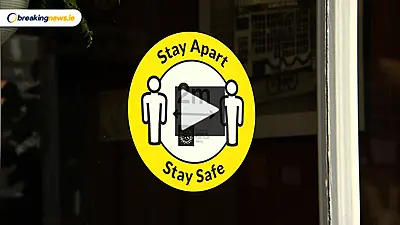The brother of a "trusting, gentle" and vulnerable pensioner, who was killed after a teenager with an intellectual disability set fire to his home in Co Monaghan, has described the "agony" of arriving at the scene only to stand "helplessly" on the roadside as his sibling "burned to death" inside.
The court also heard on Friday that it was not possible to identify 61-year-old Gerry Marron's body due to "the charred condition" of his remains and instead his siblings had to provide their DNA to officially identify the "gifted" tradesman. The family sat beside "a closed coffin" at his funeral "only imagining" what their brother looked like inside and the pain he must have suffered.
Patrick Marron told the Central Criminal Court that his brother had been "open to exploitation" and the family were concerned for his safety saying: "I witnessed first-hand Gerry being harassed and intimidated in his own home, which I was gravely concerned about".
Mr Marron's sister, Ann Doogan, told the court in a second victim impact statement that the remnant's of her brother's house following his "excruciating death" was "like something out of a horror film" with the fridge and lampshades melted from the intense heat of the fire.
Last March, Aaron McDonagh (21), of no fixed abode, pleaded guilty to manslaughter for killing Mr Marron by setting fire to his house five years ago on March 21st, 2016.
He has also pleaded guilty to committing arson without lawful excuse on the same date in that he did damage by fire to a dwellinghouse at St Macartans Villas, Carrickmacross, Co Monaghan, the property of Mr Marron, intending to damage such property or being reckless as to whether such property would be damaged and intending by the said damage to endanger the life of another or being reckless as to whether the life of another would be thereby endangered.
Sentence hearing
At the defendant's sentence hearing today, a victim impact statement was read to the court by Gerry Marron's brother, Patrick Marron, who said that they came from a family of eight and Gerry was six years younger than him. "We were taught to respect other people and their property and grew up with that ethic," he added.
Mr Marron said that his brother worked in the building trade and was "highly respected" by those for whom he worked. "He was foreman on numerous jobs in Monaghan and Dublin with local building contractors. He was recognised as a gifted tradesman and was sought by many to give his ideas on building projects and to carry out construction work," he said.
The witness said he saw the work Gerry had carried out around his own home with his "gifted hands" and it brought back good memories.
He added: "Sadly in the early 1990s Gerry's life took a turn for the worst, he was hospitalised for some time, later suffering a stroke and then being diagnosed with an acquired brain injury from which he never recovered. This resulted in him no longer being able to return to work."
Mr Marron said that his brother lived in his own home in St Macartan's Villas with the assistance of home care help and family members. "My sister Ann would look after his medical and laundry needs over weekends and as Gerry was no longer able to carry out maintenance jobs to his home himself, I would help him out on occasion doing minor repairs to his house," he said.
Vulnerability
"Since Gerry's illness his vulnerability was clear to be seen, as he had to use a walking stick to get around. In the months prior to Gerry's death, we as a family became more aware of Gerry's increased vulnerability. He was open to exploitation and we were concerned for his safety. I was so concerned about different events at his home, that I had to contact gardai a number of times in the months prior to the fire and Gerry's death," he continued.
"I witnessed first-hand Gerry being harassed and intimidated in his own home, which I was gravely concerned about and as a result I reported what I had witnessed to An Garda Siochana on a number of occasions. Gerry's great neighbours also contacted both myself and Ann at different times, extremely concerned for his welfare. Sadly the frequency of these interferences at Gerry's home added greatly to our fears for Gerry's safety. Again we reported to gardaí," he said.
Shocking news
Sadly, Mr Marron said, his "worst fears came to pass" in the early hours of March 21st, 2016, when they were awoken by a phone call to tell them about "the shocking news" that Gerry's house was on fire and to come quickly. "That night life changed for me and my family forever. We immediately drove to Gerry's home hearing sirens and seeing flashing lights as we approached. At his home all we could see were fire brigades, garda cars, smoke and panic everywhere," he said.
He continued: "I was so terrified for Gerry's life and I tried to get into Gerry's house, but I was held back and told it wasn't safe. I was in shock and terror and felt weak, feeling absolutely sick in the pit of my stomach. Some neighbours came to comfort us as we stood helpless on the road outside Gerry's home as he was burning to death. All hope vanished when I was told later that night my brother had not survived."
In a second emotional victim impact statement today, the deceased's sister, Ann Doogan, said her brother had died alone "in such horrific circumstances". She said the "horrendous manner" in which her "dear brother died" has affected her in so many ways. "That night is forever etched in my memory and I often wonder did he call for any of us," she said.
Extensive fire damage
At today's sentence hearing Detective Sergeant Kieran Regan, of Carrickmacross Garda Station, detailed the background to the blaze, telling prosecution counsel Shane Costelloe SC that gardai and emergency services were contacted around 1.30am on March 21.
Det Sgt Regan told Mr Costelloe that a neighbour, who had got as close as possible to the fire, informed gardai that Mr Marron was inside the house. There was "extremely extensive fire damage" to the terraced house and efforts were made to save Mr Marron, but they were unsuccessful, said the lawyer.
Outlining the events that led up to the incident, Mr Costelloe said that immediate enquiries were conducted at the scene and two youths had been seen in or about the house that night and into the early morning.
Interview
During his first interview, McDonagh denied all knowledge of setting fire to the house.
During the investigation, it emerged that there was an extensive history between McDonagh and Mr Marron. Mr Costelloe said that this did not pertain just to the deceased but also between the defendant and Mr Marron's immediate family. "There was an incident two weeks prior between McDonagh and the family of the deceased that led to the minor assault in respect of a family member [the Marron family]," said the detective.
A decision was made by gardaí during the investigation to search the halting site where McDonagh lived and items found in his home included a key which was subsequently identified as being the key which opened a medicine cabinet in Mr Marron's home. "This was put to him during his detention and he denied all knowledge," said the detective.
Personal papers belonging to Mr Marron were also found in the defendant's home and again he denied all knowledge.
The court heard that McDonagh has 11 previous convictions which include possession of knives, burglary, theft, handling stolen property and trespass.
The detective said McDonagh was 16 years of age and in school at the time of the offence and was a resident of Carrickmacross.
Intellectual disability
Under cross-examination, the detective agreed with defence counsel Michael Lynn SC that his client suffered from an intellectual disability at a mild level and was with an older person on the night. He also agreed that McDonagh had a difficult family background and experienced an upbringing without any boundaries and structures and was deprived. The detective further agreed that McDonagh had lost the benefit of The Children Act as he was not charged until three years after the offence and was by then 18 years of age.
Notwithstanding McDonagh's intellectual capacity and youth at the time of the offence, Mr Costelloe said the Director of Public Prosecutions considered it to be in the highest category of severity.
Mr Lynn said that mitigating factors were his client’s age, intellectual disability, family upbringing and guilty pleas.
He said McDonagh was intoxicated on the night and began abusing substances at 14 years of age.

In his submissions, Mr Lynn asked the court to take into account McDonagh's family circumstances, where a previous social worker had noted long-standing concerns with his personal care and well-being.
Mr Lynn read aloud to the court a letter of apology written by McDonagh, in which he expressed his sorrow to Mr Marron's family and said he could not make up for what had happened. He said he was deeply sorry and hopes one day that the deceased's family will forgive him.
Mr Justice Michael White remanded the defendant in custody to July 23rd, when he will be sentenced.
He expressed his deepest sympathies to the Marron family saying that it had been a long time since Mr Marron's death and it was clear from the attendance of his extended family in court that he was a much loved uncle and brother. "He was a man in his prime until his illness and became someone who was very vulnerable and had been looked after carefully by his family," he added.







